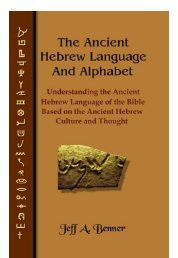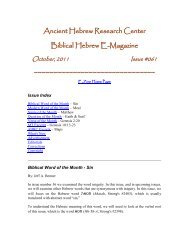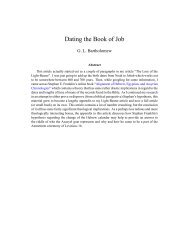My Name Forever - Ancient Hebrew Research Center
My Name Forever - Ancient Hebrew Research Center
My Name Forever - Ancient Hebrew Research Center
Create successful ePaper yourself
Turn your PDF publications into a flip-book with our unique Google optimized e-Paper software.
<strong>My</strong> <strong>Name</strong> <strong>Forever</strong> 5<br />
The <strong>Hebrew</strong> Language<br />
14. <strong>Hebrew</strong> is, and always has been, a language of consonants. A few of those consonants, were<br />
sometimes also used to represent vowel sounds. They are four: Aleph t, Hei v, Vav u, and Yud h. Not<br />
surprisingly, they are known as “VOWEL-LETTERS.” 16 The Aleph t and Hei v can represent an “ah”<br />
sound like the “a” in “father.” The Vav u can be an “oh” like the “o” in “no” or an “oo” like the “u” in<br />
“flute.” The Yud h can represent "ee” like the “i” in “machine” or “ay” like the “ei” in “eight.”<br />
15. Different words are often written with exactly the same consonants. For instance, in print, the<br />
letters rcs can be understood as, "he spoke," "it was spoken," "word," "word of," "plague," or "pasture." 17<br />
The pronunciation and meaning depend on the context and the place of the word in the sentence. This<br />
poses little difficulty to native speakers of the language. Context and syntax are usually enough to decide<br />
which word a certain combination of letters represents, even when the word contains no vowel-letters.<br />
Even if multiple pronunciations are possible for any particular combination, it's not too difficult to know<br />
how it should be pronounced. Many more examples could be cited, but it would not benefit us here. Just<br />
thumb through the Analytical Lexicon sometime and you'll see how many combinations are possible for<br />
certain words.<br />
16. Many assert that Aramaic replaced <strong>Hebrew</strong> as the common dialect of Jewish life sometime during<br />
the Babylonian captivity. John Parkhurst, in his Lexicon of New Testament Greek, gives seven reasons<br />
why this is not so. I will quote him briefly.<br />
1st. Prejudice apart, Is it probable that any people should lose their native language in a<br />
captivity of no longer than seventy years?...<br />
2dly. It appears from Scripture, that under the captivity the Jews actually retained not<br />
only their language, but their manner of writing it, or the form and fashion of their letters.<br />
Else, what meaneth Esth. viii. 9, where we read that the decree of Ahasuerus, or<br />
Artaxerxes Longimanus, was written unto every province according to the writing<br />
thereof, and unto every people after their language, and to the Jews according to their<br />
writing, and according to their language?...<br />
3dly. Ezekiel, who prophesied during the captivity to the Jews in Chaldea, wrote and<br />
published his prophecies in <strong>Hebrew</strong>...<br />
4thly. The prophets who flourished soon after the return of the Jews to their own country,<br />
namely Haggai and Zechariah, prophesied to them in <strong>Hebrew</strong>, and so did Malachi, who<br />
seems to have delivered his prophecy about an hundred years after that event...<br />
5thly. Nehemiah, who was governor of the Jews about a hundred years after their return<br />
from Babylon, not only wrote his book in <strong>Hebrew</strong>, but in ch. xiii, 23, 24, complains that<br />
some of the Jews, during his absence, had married wives of Ashdod, of Ammon, and of<br />
Moab, and that their children could not speak ,hsuvh the Jews’ language, but spake a<br />
mixed tongue... But how impertinent is the remark, and how foolish the complaint of<br />
16 J. Weingreen: A Practical Grammer For Classical <strong>Hebrew</strong> (Oxford, 1979), p. 7.<br />
17 Benjamin Davidson: The Analytical <strong>Hebrew</strong> and Chaldee Lexicon (Zondervan, 1972), p. 144.






